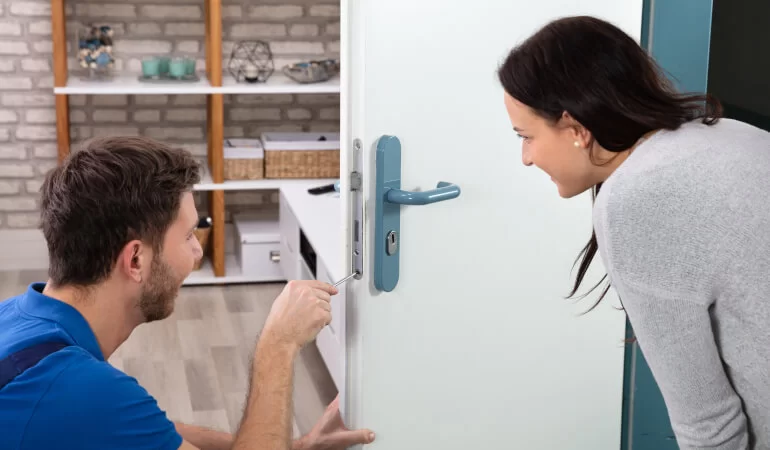
When you’re locked out and need a locksmith urgently, it’s tempting to call the first one you find online. However, not all locksmiths are trustworthy. To avoid falling victim to scams, it’s crucial to research and choose reputable locksmiths. Watch out for these red flags and follow these tips.
- Watch for Toll-Free Numbers
Legitimate locksmiths usually have local phone numbers. An 800 number often connects you to an out-of-state call center, which can signify a scam.
- Avoid Generic Business Names
If a locksmith answers the phone with a vague term like “locksmith services” instead of a company name, be cautious. Search their listed address online to ensure it’s real and not shared with multiple businesses.
- Look for Branding on Their Vehicle
A legitimate locksmith’s car will typically have the company logo or name. Unmarked vehicles could indicate a scam.
- Check Their Identification
Ask for identification and, if required in your state, a locksmith license. Legitimate locksmiths will verify your identity to ensure you’re the property owner. Be extra cautious if you live in a state without licensing requirements, as scammers often exploit this.
- Be Wary of Extremely Low Prices
If a locksmith quotes $15–$40, it’s likely a scam. Scammers use low prices to lure you in, only to inflate costs later with claims of extra work. Reputable locksmiths usually charge a service fee starting at $60.
- Confirm Pricing Before Work Starts
Get a written estimate before allowing any work to begin. If the locksmith needs to adjust the price, they should explain why. Transparency is key to avoiding unexpected charges.
- Avoid Locksmiths Who Want to Drill
Experienced locksmiths can unlock most doors without drilling. Drilling is typically reserved for high-security locks. If a locksmith insists on drilling unnecessarily, look for another professional.
- Research in Advance
Find a trustworthy locksmith before an emergency arises. Read reviews, ask questions, and save their contact details for future use. Maintaining your locks properly can also reduce the need for emergency services.
- Ask the Right Questions
Before hiring, ask questions like:
- Where are you located?
- Will you need to drill my lock?
- What is your pricing structure?
- How can I pay?
If a locksmith avoids answering or seems avoidant, don’t hire them.
Plan for Peace of Mind
Being prepared can save you from unnecessary stress during emergencies. Consider upgrading to keyless locks, which are as secure as traditional deadbolts and eliminate the risk of losing keys. Regular lock maintenance can also help prevent issues that lead to needing a locksmith in the first place.
What to Do If Scammed
If you believe you’ve been overcharged or scammed, report the incident to your state attorney general’s office. They may help recover your money or take action against fraudulent businesses.
By staying vigilant and informed, you can avoid locksmith scams and ensure your home and belongings remain secure. Save the contact of a reputable locksmith today—it could save you trouble down the line!
10 Best Kitchen Faucets For Busy Households
April 5, 2025The Role of Underlayment in Shingle Roofing Systems
April 1, 2025
Comments are closed.
More News
-
Eco-Friendly Home Solutions: A Green Living Guide
June 30, 2023 -
Innovative POP and Ceiling Designs for Your Drawing Room
August 22, 2024 -
5 DIY Pest Control Mistakes Most People Make
March 19, 2024







